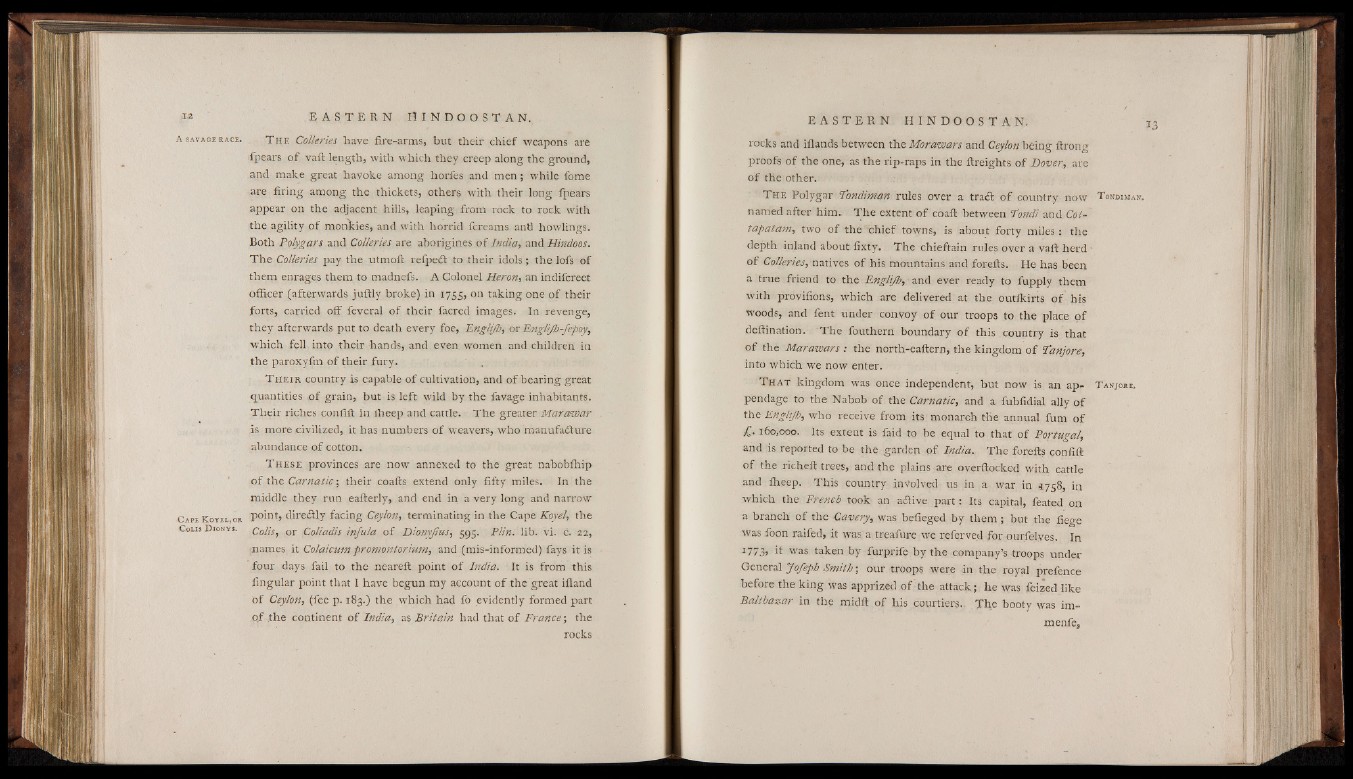
A SAVAGE RACE.
C ape K o ÿ e l , o r
C olis D ionys.
T he Colleries have fire-arms, but their chief weapons are
fpears o f vail length, with which they creep along the ground,
and make great havoke among horfes and men ; while fome
are firing among the thickets, others with their long fpears
appear on the adjacent hills, leaping from rock to rock with
the agility of monkies, and with horrid fcreams and howlings.
Both Polygars and Colleries are aborigines of India, and Hindoos.
The Colleries pay the utmofl refpedt to their idols; the lofs of
them enrages them to madnefs. A Colonel Heron, an indifcreet
officer (afterwards juflly broke) in 1755, on taking one of their
forts, carried off feveral of their facred images. In revenge,
they afterwards put to death every foe, Englijls, or Englijh-fepoy,
which fell, into their hands, and even women and children in
the paroxyfm of their fury.
T h e i r country is capable of cultivation, and of bearing great
quantities o f grain, but is left wild by the favage inhabitants.
Their riches coniiit in iheep and cattle. The greater Marawar
is more civilized, it has numbers of weavers, who manufadture
abundance of cotton.
T h e s e provinces are now annexed to the great nabobfhip
o f the Carnatic; their coafts extend only fifty miles. In the
middle they run eafterly, and end in a very long and narrow
point, diredtly facing Ceylon, terminating in the Cape Koyel, the
Colis, or Coliadis infula of Dionyjius, 595. Plin. lib. vi. c. 22,
names it Colaicum promontorium, and (mis-informed) fays it is
four days fail to the neareft point o f India. It is from this
lingular point that I have begun my account of the great ifland
of Ceylon, (fee p. 183.) the which had fo evidently formed part
o.f the continent of India, as Britain had that o f France-, the
rocks
rocks and iflands between the Morawars and Ceylon being ftrong
proofs of the one, as the rip-raps in the ftreights of Dover, are
of the other.
T h e Polygar Fondiman rules over a tradl o f country now
named after him. The extent o f coaft between Fondi and Cot-
tapatam, two o f the chief towns, is about forty miles: the
depth inland about fixty. The chieftain rules over a vaft herd
of Collertes, natives of his mountains and forefts. He has been
a true friend to the Englijh, ■ and ever ready to fupply them
with proviilons, which are delivered at the outfkirts of his
woods, and fent under convoy o f our troops to the place of
deftination. The fouthern boundary of this country is that
o f the Marawars : the north-eaftern, the kingdom o f Fanjore,
into which we now enter.
T h a t kingdom was once independent, but now is an appendage
to the Nabob of the Carnatic, and a fubfidial ally of
the Englijh, who receive from its monarch the annual fum of
£ . 160,000. Its extent is faid to be equal to that o f Portugal,
and is reported to be the garden o f India. The forefts confift
of the richeft trees, and the plains are overftocked with cattle
and iheep. This country involved us in a war in 4758, in
which the French took an aftive part: Its capital, feated on
a branch of the Cavery, was befieged by them ; but the fiege
was foon raifed, it was a treafure we referved for ourfelyes,. In
I773> it was taken by furprife by the company’s troops under
General Jofeph Smith-, our troops were in the royal prefence
before the king was apprized of the attack; he was feized like
Balthazar in the midft of his courtiers.. The booty was immenfe,
T o n d im a n .
T anjore,